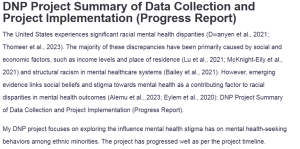DNP Project Summary of Data Collection and Project Implementation (Progress Report)
The United States experiences significant racial mental health disparities (Dwanyen et al., 2021; Thomeer et al., 2023). The majority of these discrepancies have been primarily caused by social and economic factors, such as income levels and place of residence (Lu et al., 2021; McKnight-Eily et al., 2021) and structural racism in mental healthcare systems (Bailey et al., 2021). However, emerging evidence links social beliefs and stigma towards mental health as a contributing factor to racial disparities in mental health outcomes (Alemu et al., 2023; Eylem et al., 2020): DNP Project Summary of Data Collection and Project Implementation (Progress Report).
My DNP project focuses on exploring the influence mental health stigma has on mental health-seeking behaviors among ethnic minorities. The project has progressed well as per the project timeline.
Participant Recruitment
The first step in the data collection process will be to identify the sample population and select a sample for study. The inclusion criteria require that the individuals be from a minority racial group background, either an African American, a Hispanic, or a Native American. The participants are also expected to be between 18 and 65 years old and of sound mind to provide informed consent.
Throughout the hiring process, I have concentrated on working with other professionals at the Burkardt Center at NKU to quickly identify the project’s qualifying participants. The participants will be recruited from December 18, 2024 to December 28th, 2024.
Data Collection
Since the project uses a mixed methods approach, both quantitative and qualitative data will be collected. I will use the Attitude Toward Seeking Professional Psychological Help Scale (ATSPPH) to collect the quantitative data. Using the ATSPPH tool, the quantitative data collection will focus on the openness of the patients to seeking treatment for psychological problems and their attitudes toward the value and the need to seek help. The qualitative data will be collected using semi-structured interviews based on the Health Belief Model with a focus on perceived susceptibility, perceived severity, perceived benefits, perceived barriers, self-efficacy, and cues to action.
I will be collaborating with the Burkardt Center at NKU for the data collection process. The data collection exercise will run from December 31st, 2024 to January 8th, 2025. The data analysis will commence from the 10th of January, 2025 to the 25th of January, 2025. The data collection and analysis period provides enough time to contact all participants, transcribed participant responses, filter data collected, and allow for comprehensive data analysis.
Intervention and Implementation
I collaborated with the IT department to create a digital mental health clinic and a cultural competence training program for mental health providers as interventions. The project will utilize digital systems, including smartphones and an app, to provide education and other types of information on mental health targeted at addressing beliefs on mental health issues across racial and ethnic minority groups. The provider program will provide education on diverse cultural views towards mental health, including interdisciplinary communication and collaboration across weeks 8 to week 13 of the project.
Conclusion and Next Steps
The DNP project has progressed smoothly with the various milestones being achieved as per the initial timeline. The data collection process will be completed using collaborative teams. My next steps in this project steps will focus on recruiting the study participants and planning for the data collection exercise. It also include mitigating any issues that may affect the scheduled project completion.
References
Alemu, W. G., Due, C., Muir-Cochrane, E., Mwanri, L., & Ziersch, A. (2023). Internalised stigma among people with mental illness in Africa, pooled effect estimates and subgroup analysis on each domain: Systematic review and meta-analysis. BMC Psychiatry, 23(1), 1–19. https://doi.org/10.1186/S12888-023-04950-2/FIGURES/11
Bailey, Z. D., Feldman, J. M., & Bassett, M. T. (2021). How structural racism works — Racist policies as a root cause of U.S. racial health inequities. New England Journal of Medicine, 384(8), 768–773. https://doi.org/10.1056/NEJMMS2025396/SUPPL_FILE/NEJMMS2025396_DISCLOSURES.PDF
Dwanyen, L., Holtrop, K., & Parra-Cardona, R. (2021). Reducing mental health disparities among racially and ethnically diverse populations: A review of couple and family intervention research methods (2010–2019). Journal of Marital and Family Therapy, 48(1), 346. https://doi.org/10.1111/JMFT.12573
Eylem, O., Eylem, O., De Wit, L., Van Straten, A., Steubl, L., Melissourgaki, Z., Danlşman, G. T., De Vries, R., Kerkhof, A. J. F. M., Bhui, K., & Cuijpers, P. (2020). Stigma for common mental disorders in racial minorities and majorities a systematic review and meta-analysis. BMC Public Health, 20(1), 1–20. https://doi.org/10.1186/S12889-020-08964-3/FIGURES/6
Lu, W., Todhunter-Reid, A., Mitsdarffer, M. L., Muñoz-Laboy, M., Yoon, A. S., & Xu, L. (2021). Barriers and facilitators for mental health service use among racial/ethnic minority adolescents: A systematic review of literature. Frontiers in Public Health, 9, 641605. https://doi.org/10.3389/FPUBH.2021.641605/BIBTEX
McKnight-Eily, L. R., Okoro, C. A., Strine, T. W., Verlenden, J., Hollis, N. D., Njai, R., Mitchell, E. W., Board, A., Puddy, R., & Thomas, C. (2021). Racial and ethnic disparities in the prevalence of stress and worry, mental health conditions, and increased substance use among adults during the COVID-19 pandemic — United States, April and May 2020. MMWR. Morbidity and Mortality Weekly Report, 70(5), 162–166. https://doi.org/10.15585/MMWR.MM7005A3
Thomeer, M. B., Moody, M. D., & Yahirun, J. (2023). Racial and ethnic disparities in mental health and mental health care during the COVID-19 pandemic. Journal of Racial and Ethnic Health Disparities, 10(2), 961–976. https://doi.org/10.1007/S40615-022-01284-9/FIGURES/3
ORDER A PLAGIARISM-FREE PAPER HERE
We’ll write everything from scratch
Question 
This is a progress report of the implementation of your project. The assignment is a two-page written summary in narrative form of your progress with project implementation and data collection. Attach a spreadsheet or table of any raw data that was collected this semester to the 2-page summary. Provide an updated reference list with this assignment. Reference pages are not included in the 2 page assignment limit.

DNP Project Summary of Data Collection and Project Implementation (Progress Report)